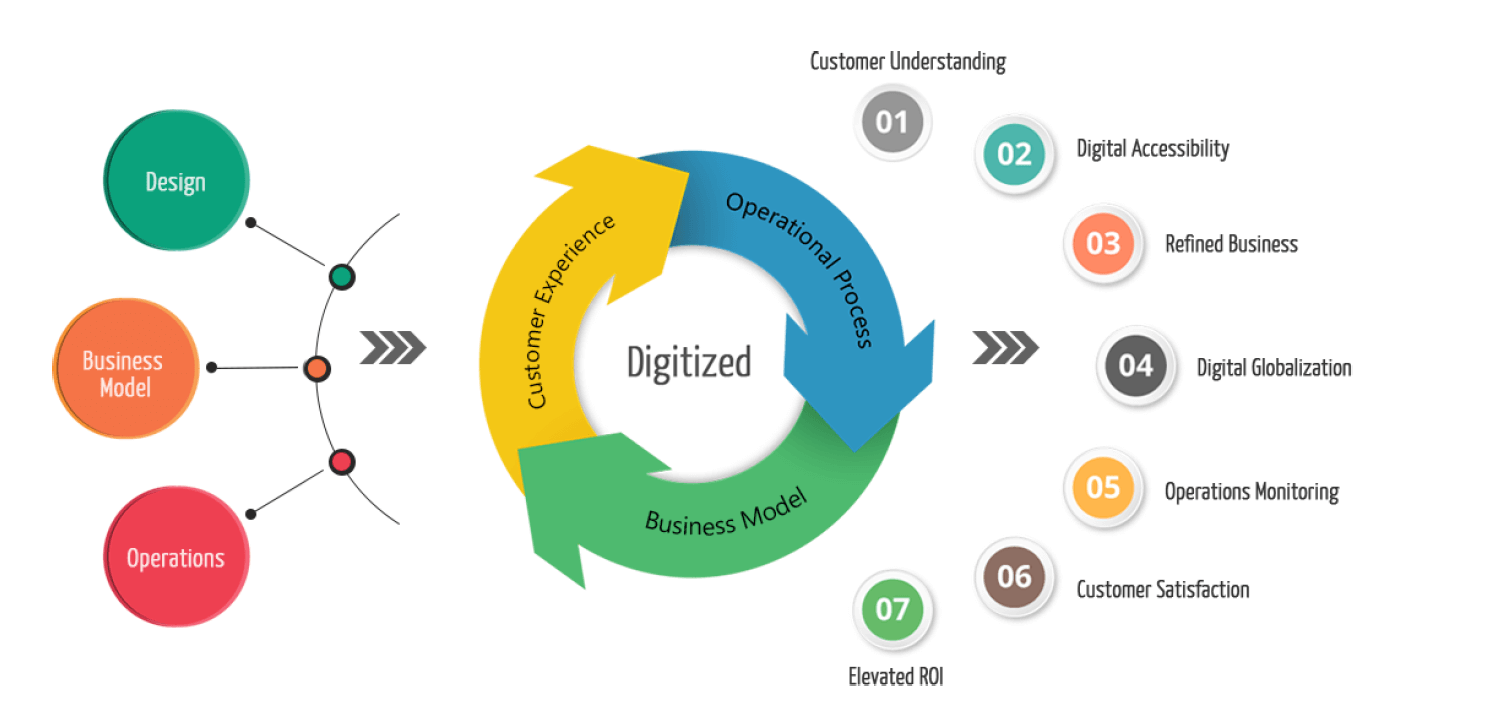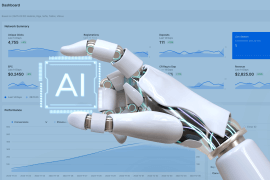As you may already know, there is a great deal of work required for digitally transforming your affiliate business.
Of course, affiliate business is “digital” by default. We don’t need to digitalize or put online a business that can only exist in the digital world in the first place, however, there are still many ways you can improve on. But, first, let’s see what digital transformation is, and then we will explore ways to implement it into your affiliate business.
What exactly is digital transformation?
Any strategic plan that uses data science and marketing technologies to solve fundamental challenges is referred to as a digital transformation.
The aim is to reinvent the company in ways that prioritize consumers, leveraging the power of digital technologies to create seamless experiences with them.

Businesses’ digital transformations, by definition, are far-reaching projects that can alter how you think about people, processes, and even company culture.
Every organization’s digital transformation roadmap is unique, but some common threads include:
- Digital transformation requires meticulous preparation as well as management buy-in. Leaders who can articulate a digital-first vision and demonstrate how ROI would be assessed have a better chance of success.
- Personalization enables the development of innovative experiences that are appealing to consumers and support effective digital transformation strategies. Each organization must determine the best way to incorporate personalization for its particular circumstances. Following a one-size-fits-all solution is doomed to fail.
- Memorable interactions that are tailored to the user necessitate a steady stream of high-quality content. Affiliate marketing automation and artificial intelligence will help relieve the burden on content creators, but they must be used strategically and not as a replacement for human intelligence, empathy, and imagination.
In other words, digital transformation (also known as DX or DT) is the use of technology to generate value and new services for different stakeholders (customers in the broadest sense), innovate, and gain the skills to respond to changing circumstances quickly.
Let’s take affiliate marketing, which is a digital form of business by default. Digital transformation will mean the employment of artificial intelligence that allows better personalization of the customer experience.

For example, if – as a part of your digital transformation, you use an affiliate marketing software such as Scaleo, you can employ AI-powered tools, that include:
- automatic redirection of traffic
- filtering out bad traffic in real-time
- redirecting campaigns
- personalization, based on visitors location
- and more.
As opposed to traditional affiliate marketing methods, which was done mainly blindly, digital transformation allows you to optimize your campaigns fully and, as a result, fully optimize your ROI.
Digital transformation is about more than just division and technology. It is about value, people, optimization (you can use optimization calculator), and the ability to quickly adjust when necessary through the intelligent application of technology and knowledge.
Why is the digital transformation the latest business requirement?
Recent global developments surrounding the Coronavirus crisis have sent a clear message to the business world: markets can change in the blink of an eye.
We’re all looking for more flexible ways to function, especially in a rapidly changing business such as affiliate marketing.
At the same time, we need to develop new ways to serve customers and put those massive, ambitious plans into action as soon as possible.

A gradual, long-term approach can not solve deep-rooted problems or shape human relations in an all-digital world.
We cannot simply improve processes and services; we must completely rebuild them.
Digital transformation strategies shape the business around new possibilities by leveraging the power of data science and marketing technologies.
Strategic in nature, these programs affect all levels of the enterprise, from the C-suite to content writers and customer service representatives. They are iterative and experimental, revealing observations that contribute to better decisions along the way.
If you are embarking on a digital transformation to survive market change, create a more active community, or drive online sales, a deliberate and educated strategy will deliver the best long-term results. Check for example Starbucks marketing strategy to learn from this case study.
Companies all over the world are embarking on ambitious digital ventures in order to achieve game-changing outcomes.
In today’s world, digital transformation has taken on new significance, and we are excited to see how the possibilities for the future as a whole unfold.
Technologies and services for digital transformation

Effective transformation initiatives include a digital experience platform and related services. The digital experience framework that serves as the cornerstone for your digital transformation must allow you to collect data at and touchpoint throughout the customer journey and use it to create rewarding customer experiences, such as:
- Better participation,
- Stronger relationships,
- Increased sales,
- Increased loyalty.
Here are a few tools you should have in your toolbox:

- Marketing software: As I already mentioned, affiliate marketing software is essential for your business if you are in ecommerce, online retail, or affiliate business. The employment of this kind of AI-powered software allows you to make instant changes to your marketing strategies and not only personalize and improve the buyer’s journey but also increase your revenue drastically.
- A digital experience platform: To build a unique digital experience, you need technology that allows you to understand consumer behavior and deliver relevant content at the right time. It is important to provide a digital experience platform that offers content management, digital marketing, affiliate marketing and commerce solutions all in one place. Your digital transformation preparation and roll-out process should be driven by real-time personalization, marketing automation, and omnichannel data capture. You can, again, use a white label marketing software for it as a base, or develop a custom one for your business.
- E-commerce: If online conversions are a top priority for your business transformation, you’ll need a way to enable customized shopping experiences. The right commerce approach will assist you in remaining competitive in the industry.
- Cloud solutions: By combining cloud technology and these tools, you can harness the power of digital marketing while benefiting from the pace and size of the cloud. Choose the right combination of cloud technology and marketing resources, and you’ll be able to reduce the overall cost of ownership while accelerating time to market.
- A central location for content: Any digital transformation should provide efficiency improvements. A platform that includes integrated digital asset management (DAM), marketing resource management (MRM), product content management (PCM), and a content marketing platform (CMP) can help the entire marketing team streamline content operations.
- Services and consulting: Through advanced personalization and marketing techniques, consulting firms, agency partners, and managed cloud hosting will assist clients in accelerating their digital business transformations.
The scope of digital transformation

These 5 points describe the various ways in which customers can engage with brands and companies can meet and learn from their audiences:
- Digital devices – Audiences engage with brands as they interact with company websites and mobile applications, usually via a mix of connected devices such as smartphones, tablets, desktop computers, TVs, and gaming devices.
- Digital networks – most interactions on these devices take place through a browser or software from the major platforms or services, including Facebook (and Instagram), Google (and YouTube), Twitter, and LinkedIn.
- Digital media – refers to a variety of paid, controlled, and received contact platforms for reaching and engaging viewers, such as ads, email and messaging, search engines, and social networks.
- Digital data – the information that companies gather about their audience from profiles and interactions with businesses, (which is now legally covered in most countries).
- Digital technology – the marketing technology stack, that companies use to build interactive interfaces ranging from websites and mobile apps to in-store kiosks and email campaigns.
Success factors for digital transformation strategies

Transformational change requires sufficient investment in digital marketing activities. We suggest that transformation initiatives include adequate investment in all six pillars:
- Digital marketing management: refers to the tools and infrastructure required to create tactics, action plans, resources, budgets, and KPI dashboards to test, learn, improve, and incorporate all marketing and sales communications. Marketing technology, data, insight, and optimization are critical infrastructure investments.
- Digital objectives and metrics: Using digital marketing dashboards, you can set smart goals and define priorities in analytics for daily analysis, and an improved action plan for increasing interaction and revenue.
- Media in the digital age: Increase exposure by combining paid, leased, and earned media with enough investment to gain recognition as consumers search for your goods and services.
- Digital content marketing entails creating high-quality, industry-leading content to drive all of the marketing efforts, from search to social to email marketing.
- Digital customer experience: Optimize the company’s website, software, and social media accounts. Integrate digital marketing with front-line sales and support staff to engage, clarify, and convert customers.
- Digital messaging, also known as “conversation marketing,” is the use of personalized communications to welcome, inform, and cultivate prospects and customers through websites, email marketing, and mobile alerts.
Conclusion
If you are in the affiliate business (or any other, for that matter), looking to start a digital transformation for your company, there are a lot of factors to consider. You should know what you will be employing, where your business can benefit from additional digitalization and modernization. By harnessing the power of artificial intelligence and automation, digital transformation allows better personalization of the customer experience.
Last Updated on January 17, 2024






